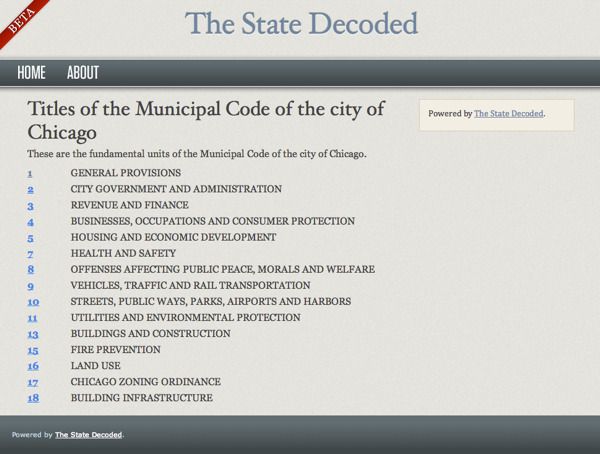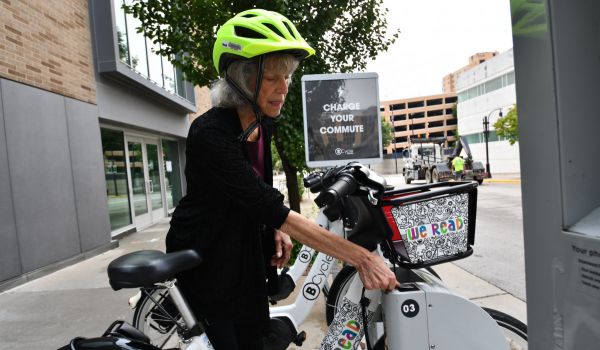Some rather pretty legal websites have popped up lately: PhillyCode.org, ChicagoCode.org and, as of last Thursday, SanFranciscoCode.org. This is how municipal code would design itself if it actually wanted to be read.
The network of [city]Code.org sites is the output of The State Decoded, a project of the OpenGov Foundation (See correction below), which has its own fascinating provenance. That D.C.-based non-profit grew out of the fight in Congress over the SOPA and PIPA digital copyright bills a few winters ago. At the time, the office of Rep. Darrell Issa, more recently of Benghazi fame, built a platform called Madison that invited the public to help edit an alternative bill. Madison outlived the SOPA debate, and was spun out last summer as the flagship project of the OpenGov Foundation, helmed by former Issa staffer Seamus Kraft.
“What we discovered,” Kraft says, “is that co-authoring legislation is high up there on what [the public wants to] do with government information, but it’s not at the top.” What heads the list, he says, is simply knowing “what are the laws?” Pre-SanFranciscoCode, the city’s laws on everything from elections to electrical installations to transportation were trapped in an interface, run by publisher American Legal, that would not have looked out of place in “WarGames.” (Here’s the comparable “old” site for Chicago. It’s probably enough to say that Philadelphia’s comes with a “Frames/No Frames” option.) Madison needed a base of clean, structured municipal code upon which to function, and Kraft and company were finding that in cities across the country, that just didn’t exist.
Fixing the code, Kraft says, starts with him “unlawyering the text” that is either supplied to them by the city or scraped from online. This involves reading through the city code and looking for signposts that indicate when sections start, how provisions nest within them, and other structural cues that establish a pattern. That breakdown gets passed to the organization’s developers, who use it to automatically parse the full corpus. The process is time consuming. In San Francisco, 16 different patterns were required to capture each of the code’s sections. Often, the parser needs to be tweaked. “Sometimes it happens in a few minutes or a few hours,” Kraft says, “and sometimes it takes a few days.”
The hope is that by churning through cities they’ll be able to construct a “master parser” attuned to the nuances of the different publishing formats in use across the country. “There are 15,000 government entities in the United States,” says Kraft, 28, “and I don’t want to be 40-years-old and standing up the last city in America.”
The site’s smooth interfaces are intentional, and a key part of the bid to make city code accessible to the layperson. (John Athayde, a user interface and user experience designer from the Washington, D.C.-based tech company LivingSocial, designed The State Decoded’s templates.) Kraft says that they’ve settled on the controversial font Helvetica Neue, now favored as part of Apple’s iOS 7, as the most readable. Bulk data downloads and APIs, so often the focus of open government data work, are pushed into the background. “Putting that stuff front and center,” Kraft says, “you scare away everyday Americans.”
Over the long haul, Kraft has in mind adopting the customizability of YouVersion, the online digital Bible that allows users to choose fonts, colors and more. Kraft, a 2007 graduate of Georgetown who will cite the Catholic Church’s distributed structure as a model for networked government, proclaims YouVersion “the most kick-ass Bible you’ve ever seen. It’s stunning.” He’d like to do the same with municipal code, for the benefit of both the average American and those who have more regular engagement with local legal texts. “If you’re spending all day reading law,” he says, “you should at the very least have the most comfortable view possible.”
Correction: Waldo Jaquith points out in the comments that the OpenGov Foundation is making use of the State Decoded’s software, but that the platform is a project of, well, him. Apologies for the confusion. More on that relationship — and the state of the “decoded” field — below. Again, I regret the error.

Nancy Scola is a Washington, DC-based journalist whose work tends to focus on the intersections of technology, politics, and public policy. Shortly after returning from Havana she started as a tech reporter at POLITICO.









